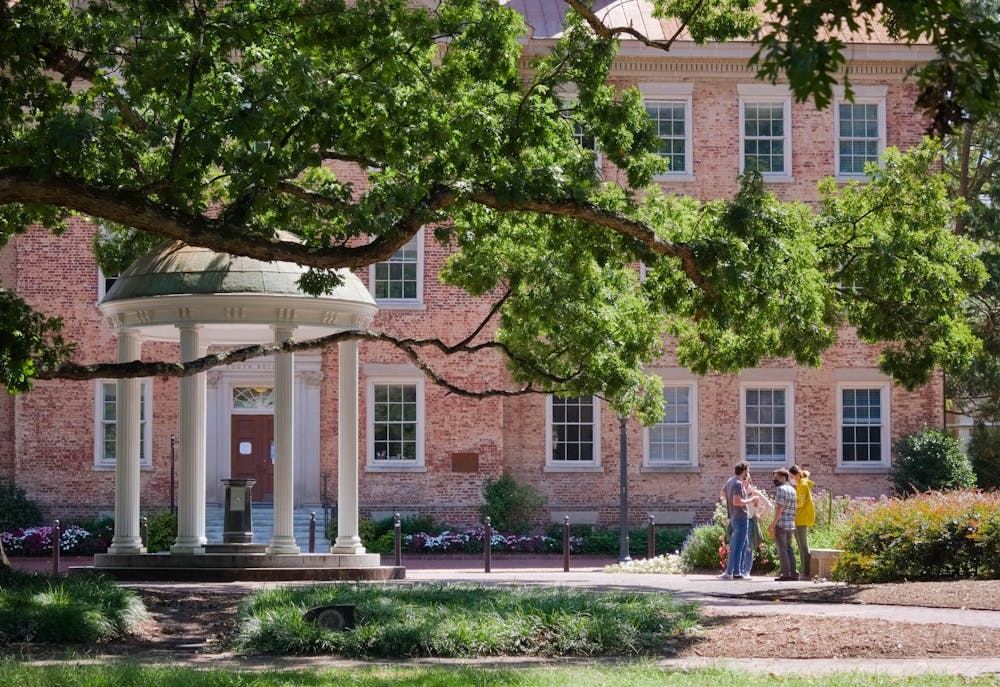The Board of Governors governs the entire 17-school UNC System and consists of 24 voting members elected by the North Carolina General Assembly, which is currently controlled by the Republican Party. The UNC Board of Trustees is made up of 13 people — eight elected by the BOG, four appointed by the General Assembly and the current student body president, ex officio.
Though the Coalition for Carolina was in the works following Chapman’s open letter, the three primary reasons for its creation date back to three years ago, according to the coalition’s Thursday press release.
The first reason the coalition cited was the University’s “bungling” of Confederate monument Silent Sam after it was toppled in fall 2018. Second, UNC’s failed reopening and subsequent closing in fall 2020 as COVID-19 ran rampant across campus.
And most recently, the BOT’s initial decision to not offer tenure to Hannah-Jones after backlash from conservatives who disagree with the Pulitzer Prize-winner’s work.
Joyce Fitzpatrick, UNC alumna and chairperson of the Hussman School of Journalism and Media’s Board of Advisors, read Chapman’s op-ed in the DTH following the news that Hannah-Jones would not join the University faculty.
“I thought, you know, it’s time for us to stand up,” Fitzpatrick said.
In addition to Chapman and Fitzpatrick, the coalition’s steering committee includes Roger Perry, former chairperson of the BOT, and Paul Fulton, former BOG member and former dean of the Kenan-Flagler Business School.
“I certainly hope that the coalition will become an effective voice to defend and protect the University, the faculty, the administration, the chancellor and to protect this mission to serve the people of the state,” Perry said.
In his remarks during the BOT’s special meeting to vote on tenure for Hannah-Jones, Chancellor Kevin Guskiewicz spoke about the University’s governance model.
“I’ve said it before – our tradition of shared governance at the University is now and has been one of great collaboration, and often one of great tension,” Guskiewicz said. “Yet, we all have a shared passion for Carolina and staying true to our mission.”
In a written statement to the DTH on Thursday, Guskiewicz praised the University's top rankings nationwide and said its students and faculty continue to solve "the greatest challenges of our time."
"As a taxpayer-supported public institution, our partnership with the General Assembly is critical," Guskiewicz said in the statement. "We are continuing to serve the people of North Carolina and beyond through the University’s priorities and accomplishments as a great public research institution."
To get the day's news and headlines in your inbox each morning, sign up for our email newsletters.
Walter Jackson, chairperson of the UNC Black Pioneers, is a member of the Coalition for Carolina’s steering committee. Jackson graduated from the University in 1967, and he was the third Black student to graduate from UNC with a degree in journalism.
Jackson said he joined the coalition as an individual, not on behalf of the Black Pioneers.
He said he still bears the scars of things that happened to him while he was an undergraduate student, but hopes to help make UNC a place where Black students will want to enroll and graduate from.
“I want Carolina to be a place where my grandchildren can aspire to attend and can be proud to attend if they elect to go there,” Jackson said.
For Fitzpatrick, one immediate goal of the Coalition for Carolina’s public launch is for as many people to join the group as possible. If thousands of people — alumni, faculty, staff and other community members — were to join, Fitzpatrick said, their voices would be harder to ignore.
“We want to restore the public’s confidence in the University, in its leadership,” Fitzpatrick said. “And we want to let the Board of Governors know that we are watching.”
@praveenavsoma
university@dailytarheel.com




